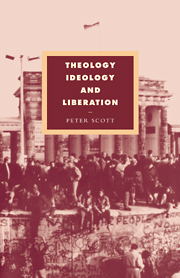1 - Theology and the Marxist critique of ideology
Published online by Cambridge University Press: 05 December 2011
Summary
THE SOCIAL LOCATION OF THEOLOGY
It is perhaps somewhat ironic that there is now a need for European theology to catch up with the concerns of theologies coming out of Latin America, Africa and Asia. As I read them, these theologies are asking the profound question as to what it is that we, as social animals, might trust. I am speaking here of a specific account of trust: a concern with the trustworthiness of our social structures and relations. More precisely, it is to ask whether there may be (liberative) theological insights into the question of the restrictive or emancipatory character of social relations and structures.
At the back of this for Christians is the difficult matter of whether theological interpretations may be trusted. How might Christians think theologically about social matters? Is a theological contribution possible that will not be assimilated into the post-Cold War ‘order’ and which does not retreat into ‘religious subjectivity’? Against such a background, the intention of this book is to offer a constructive proposal for a liberative theology. I plan to do this by joining the debate on the relation between theology and Marxism. It is out of this engagement, I shall be suggesting, that a genuinely liberative theology may emerge. So this book is a theological enquiry from the ‘centre’: an economic and military ‘centre’ which structures the space-time of this paranational society.
- Type
- Chapter
- Information
- Theology, Ideology and Liberation , pp. 9 - 41Publisher: Cambridge University PressPrint publication year: 1994

